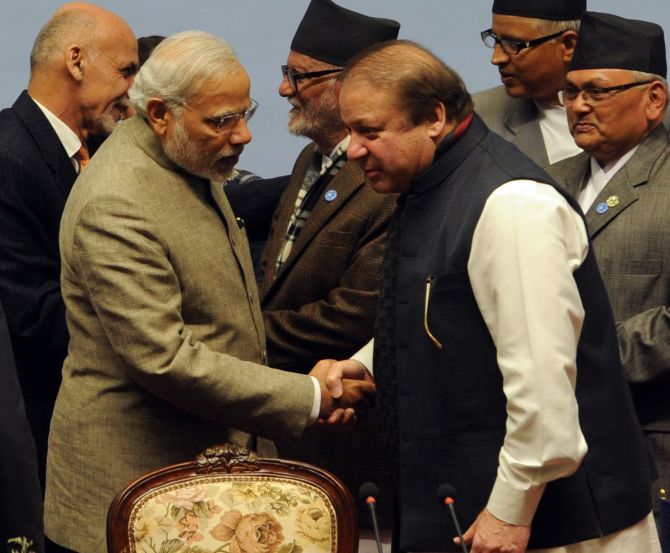
Pakistan is growing restive with the below the radar screen diplomacy. This is the issue Modi and Sharif will grapple with at their Washington meeting, says Rajeev Sharma.
Prime Minister Narendra Modi resumes his foreign tours this month end after his second longest-ever stay in the country.
He begins his three-nation tour with a diverse agenda: Brussels (March 30) for the India-European Union summit, Washington, DC (March 31-April 1) for the fourth and final Nuclear Security Summit, and Riyadh (April 2) for his maiden bilateral visit, the first by an Indian prime minister to Saudi Arabia after six years.
Modi will embark on his foreign tour after a little over three months. His last foreign destination was Lahore on December 25, an impromptu visit which capped his State visits to Moscow and Kabul.
His longest uninterrupted stay in the country was between his visit to Kathmandu for the SAARC summit (November 25-27 in 2014) and his trip to the Indian Ocean island countries beginning with Seychelles (March 10-11 in 2015).
The prime minister has already conveyed to the ministry of external affairs that he will cut down on his foreign visits and will focus on domestic issues. Modi's decision stems from the Opposition's criticism of his frequent foreign travels. Moreover, he has already covered most of the key nations where a prime ministerial visit was deemed necessary.
Significantly, the most important and sensitive event of his three-leg foreign tour will have nothing to do with the ostensible reasons of his multilateral visits to Brussels and Washington and his bilateral visit to Saudi Arabia.
It will be his bilateral meeting with his Pakistani counterpart Nawaz Sharif on the sidelines of the Nuclear Security Summit in Washington.
The Modi-Sharif meeting is likely to take place on March 31.
The two prime ministers are expected to take stock of the state of bilateral relations which after the high of Modi's stunning air-dash to Lahore from Kabul on Christmas Day have taken a serious hit due to the terror attack on the Pathankot airbase a week later.
The two countries' national security advisors, Ajit Doval and Lieutenant General Nasir Khan Janjua (retd), have been in close touch since the Pathankot attack, though virtually nothing has emerged in the public domain as to what the two NSAs have been discussing.
Pakistan has been pressing India for resumption of foreign secretary-level talks in the structured format and has taken unusual steps like taking Jaish-e-Mohammed chief Masood Azhar in 'protective custody' and lodging a case against unknown persons for the Pathankot attack to mollify India.
However, India has been unrelenting in not obliging Pakistan, saying that New Delhi will go by concrete deliverables rather than sweet-sounding words and cosmetic actions.
Besides, another unthinkable happened in the India-Pakistan bilateral context last week when the Pakistani NSA shared with his Indian counterpart real time intelligence, warning India that at least ten Pakistan-based terrorists had sneaked into India for possible high profile terror attacks.
While India promptly deployed National Security Guard commandos in Gujarat, where the Pakistani terrorists had reportedly sneaked into, and stepped up vigil at many places across the nation including in the national capital, mercifully the feared terror strike did not take place as expected on Shivratri.
India continues to be on high alert. The fear is that the terrorists may be lying low and may strike just around the time Modi and Sharif meet in Washington. While there may not have been much progress towards normalisation of bilateral relations since Modi's visit to Lahore on Nawaz Sharif's birthday on December 25, a positive feature that has come to the fore is that the two NSAs have been in constant touch throughout.
For now this seems to be a workable template in the India-Pakistan bilateral context -- that their diplomacy is driven by the two NSAs rather than by their foreign offices.
This suits India better as the NSA-level contacts remain opaque and out of the public domain, unlike foreign policy, which is conducted through the foreign offices which inevitably attracts public glare.
But Pakistan is growing restive. It is not happy with the below the radar screen diplomacy. Pakistan wants to play to the gallery and this can be done only in the format of foreign secretary-level talks.
It is this issue that Modi and Sharif will inevitably grapple with during their Washington meeting. There is a lot of time left for the Washington event. There may well be many a slip between the cup and the lip.
Another big ticket terror attack may upset the leaders' plans.
Rajeev Sharma is an independent journalist and strategic analyst who tweets @kishkindha




.jpg)





